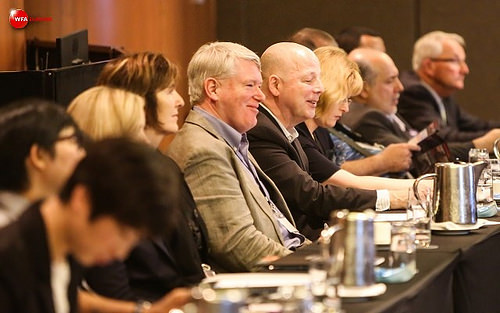WFA gives snap shot of Global Agency Remuneration Trends 2014
31/01/2014
Back to the overview
WFA has showcased the interim results from its survey on Global Agency Remuneration Trends 2014 at the meeting of WFA's SOURCINGFORUM on 24th January at Unilever's HQ in London. 40 members attended the session, which focused on marketing procurement organisational structure, challenges within agency management and agency remuneration.
The results focused on the use of performance incentives and how members structure the component of their model given over to rewarding agency performance. The full report will be shared with members soon but some of the core trends were identified:
The discussion amongst participants broadened to touch on how to use incentives when the project fee or overall budget spent with that agency is relatively small. Linked to this of course, is the issue of attracting talent to your account. One school of thought suggests that if you pay an agency to do a job, then they should do it to the best of their abilities. Another more circumspect opinion reflects the agency business and simple human nature, in the sense that exciting brands that pay well and are “good clients” get the talent they deserve.
The group also discussed the nuts and bolts of managing performance based models. For example, how do you account for adjustments to scopes of work, and changes to agency resources? Similarly, with regards to payment timing, does it make sense to reward the agency with a bonus at the end of the year when successes and key account leaders may have shifted onto other projects? Lastly, how to keep things simple? However clever the formula, the more complex the model the more resource intensive it will be for the client and the agency to manage.
The WFA SOURCINGFORUM next meets in Zug (Switzerland) on 24th April and is kindly hosted by Johnson & Johnson. Agency remuneration will feature on the agenda. Members can login to download interim results slides below.
For a full report please contact Steve [email protected]
Sign up to monthly WFA news
The results focused on the use of performance incentives and how members structure the component of their model given over to rewarding agency performance. The full report will be shared with members soon but some of the core trends were identified:
- Across all agencies and in all regions worldwide, labour-based fees (labour time calculated by the hour / % of personnel time) is the most popular model, used in almost 50% of cases.
- Performance based fees (based on outputs assessed by various metrics) are up from 15% to 24% of models in use.
- Commission (variable, fixed rate and sliding scale) use is stable across all regions, but rare outside of media agency agreements.
- Expressions of intention to change remuneration models all point to the adjustment or increased use of performance incentives.
- Procurement is increasingly in charge of managing agency remuneration. In 2011, 43% of respondents said procurement led the process. In 2014 that figure has risen to 51%.
- Metrics to assess performance vary across agency types. The most popular hard metrics for creative agencies are sales volume and market/brand share, whereas for media agencies it is buying targets. Softer metrics are easier to measure but less robust: relationship management and agency service delivery are common across all agency performance metrics.
The discussion amongst participants broadened to touch on how to use incentives when the project fee or overall budget spent with that agency is relatively small. Linked to this of course, is the issue of attracting talent to your account. One school of thought suggests that if you pay an agency to do a job, then they should do it to the best of their abilities. Another more circumspect opinion reflects the agency business and simple human nature, in the sense that exciting brands that pay well and are “good clients” get the talent they deserve.
The group also discussed the nuts and bolts of managing performance based models. For example, how do you account for adjustments to scopes of work, and changes to agency resources? Similarly, with regards to payment timing, does it make sense to reward the agency with a bonus at the end of the year when successes and key account leaders may have shifted onto other projects? Lastly, how to keep things simple? However clever the formula, the more complex the model the more resource intensive it will be for the client and the agency to manage.
The WFA SOURCINGFORUM next meets in Zug (Switzerland) on 24th April and is kindly hosted by Johnson & Johnson. Agency remuneration will feature on the agenda. Members can login to download interim results slides below.
For a full report please contact Steve [email protected]
Sign up to monthly WFA news
















































































